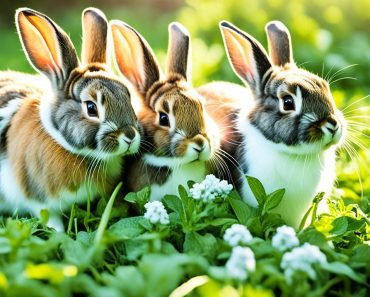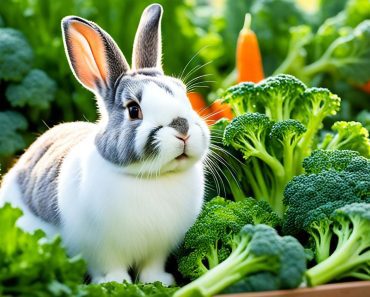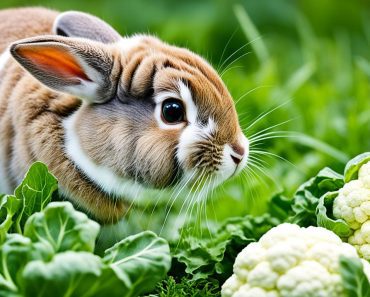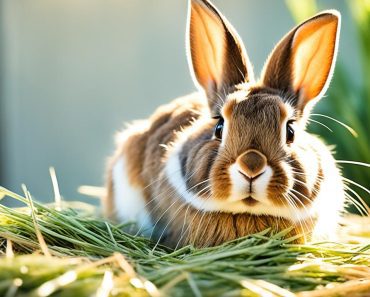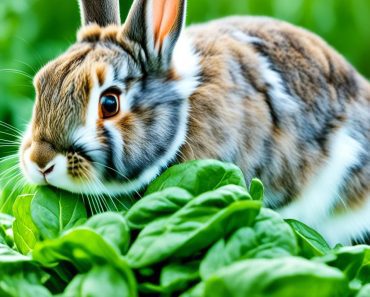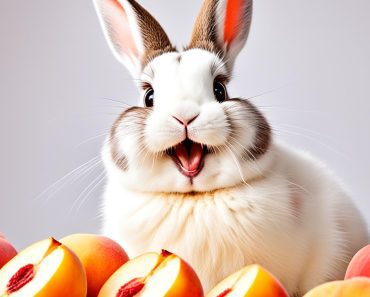Grapes are a delicious and refreshing fruit that many of us enjoy, but can rabbits indulge in this fruity treat as well? As a rabbit owner, I often wonder about what foods I can safely offer to my furry friend. So, can rabbits eat grapes? Let’s find out.
When it comes to rabbits and grapes, the good news is that grapes are not toxic to rabbits and can be included in their diet on occasion. In fact, grapes can provide some nutritional benefits to our furry friends. They contain fiber, B vitamins, and vitamin K, which can support their overall health.
However, before you rush to feed your rabbit a pile of grapes, it’s important to understand the potential risks involved. Grapes are high in sugar, and consuming excessive amounts can upset a rabbit’s sensitive stomach, leading to issues like weight gain and even diabetes. Additionally, rabbits need a diet rich in fiber, and too many carbs and sugars without enough fiber from hay and pellets can cause gastrointestinal problems.
To safely feed grapes to your rabbit, it’s essential to follow some guidelines. Always offer grapes in moderation and as an occasional treat rather than a regular part of their diet. Remember to remove the seeds before feeding grapes to your rabbit as they can pose a choking hazard. And if you have a baby rabbit, it’s best to wait until they are used to their regular diet of pellets and hay before introducing grapes into their eating routine.
Now that you know the basics of feeding grapes to rabbits, let’s explore the nutritional value of grapes for these adorable pets.
Can Rabbits Eat Grapes? Yes, you can feed them occasionally in small amounts.
- Grapes are not toxic to rabbits, but they should be fed in moderation.
- Always remove the seeds to prevent choking hazards.
- Too many grapes can upset a rabbit’s stomach and lead to weight gain or diabetes.
- Feeding grapes once or twice a month as a treat is generally recommended.
- Monitor your rabbit for any signs of digestive issues after eating grapes and adjust their diet if necessary.
The Nutritional Value of Grapes for Rabbits
Grapes can be a healthy addition to a rabbit’s diet due to their nutritional value. These delicious fruits provide a variety of vitamins and minerals that contribute to the overall well-being of rabbits.
One of the key benefits of grapes is that they contain vitamin A, which supports the rabbit’s vision and immune system. Additionally, grapes are a good source of vitamin C, an essential antioxidant that helps protect the rabbit’s cells from damage and promotes collagen production.
Grapes also contain iron and magnesium, important minerals that support various bodily functions in rabbits. Iron contributes to the production of healthy red blood cells, while magnesium plays a role in nerve function and muscle health.
Another valuable nutrient found in grapes is vitamin B6, which is essential for the rabbit’s metabolism and growth. Potassium, another mineral in grapes, helps maintain proper heart and muscle function, while manganese supports bone development and overall skeletal health in rabbits.
While grapes offer these nutritional benefits, it’s crucial to remember that they also have a high sugar and water content. Therefore, it’s important to feed grapes to rabbits in moderation and as part of a balanced diet.
The Importance of Moderation
While grapes are a healthy treat for rabbits, it’s essential to exercise caution and avoid overfeeding. The high sugar content in grapes can lead to weight gain, gastrointestinal issues, and even diabetes in rabbits if consumed excessively.
To ensure your rabbit’s well-being, consider grapes as a special, occasional treat rather than a daily staple in their diet. This will help prevent any potential health issues that could arise from excessive sugar consumption.
Remember, a balanced diet for rabbits should primarily consist of hay, fresh vegetables, and limited amounts of fruits like grapes. Providing a variety of healthy treats will ensure that your rabbit receives all the necessary nutrients without compromising their health.
Feeding Grapes to Rabbits Safely
When it comes to feeding grapes to rabbits, ensuring their safety is paramount. Follow these guidelines to protect your furry friend:
- Choose fresh, washed, and seedless grapes for your rabbit’s consumption. This reduces the risk of any potential contamination or choking hazards.
- For smaller rabbits, it’s best to cut the grapes in half before offering them. This makes it easier for them to handle and digest.
- For larger rabbits, a whole grape is suitable. However, always monitor their chewing and swallowing to prevent any complications.
- Feeding grapes once or twice a month as a treat is recommended. This allows your rabbit to enjoy the fruit without any adverse effects on their health. Remember, moderation is key.
- Pay close attention to your rabbit after they consume grapes. Look out for any signs of digestive issues or discomfort, such as bloating or diarrhea.
- If your rabbit experiences any digestive problems or discomfort after eating grapes, it’s important to discontinue feeding them grapes altogether.
“Remember to always prioritize your rabbit’s safety and well-being when incorporating grapes into their diet. Monitoring their response and adjusting accordingly is essential for their health.”
To better understand the guidelines for feeding grapes to rabbits, refer to the image below:
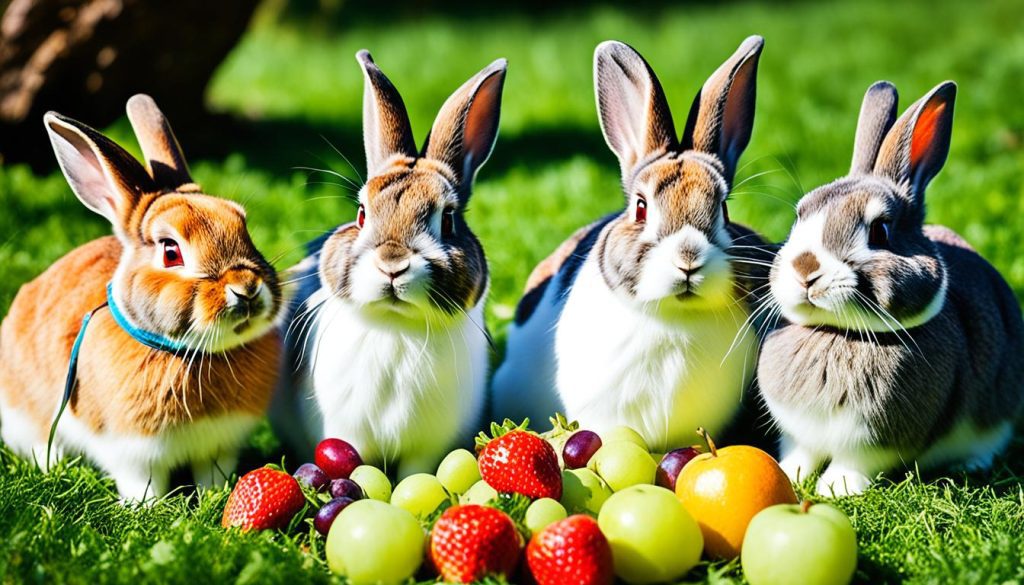
Healthy Alternatives to Grapes in a Rabbit’s Diet
While grapes can be safely fed to rabbits in moderation, it’s always good to have alternatives in their diet. Rabbits enjoy a variety of fruits that can provide them with different nutrients and flavors to enjoy. Some healthy alternatives to grapes for your rabbit’s diet include:
- Apples (without seeds)
- Melons
- Pears
- Peaches
- Plums
- Bananas
These fruits not only offer a delicious taste but also provide essential vitamins and minerals to support your rabbit’s overall health. When introducing any new food into your rabbit’s diet, it’s important to do so slowly and in small quantities to avoid any potential digestive issues.
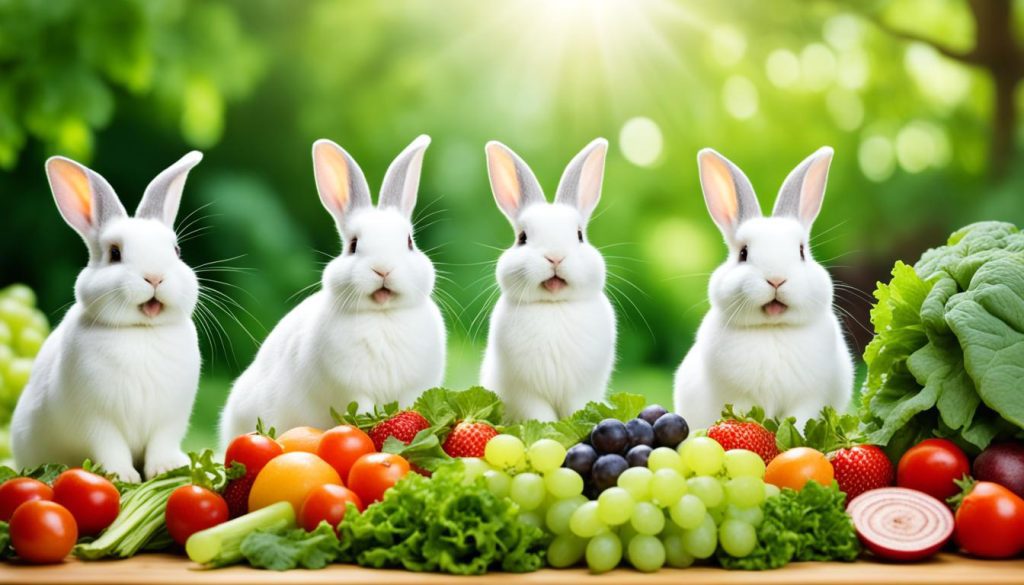
The Risks of Overfeeding Grapes to Rabbits
Feeding grapes to rabbits in excess can pose various risks to their health. The high sugar content in grapes can lead to digestive issues such as diarrhea, gas, and bloating. Rabbits’ digestive systems are delicate, and consuming too many grapes can disrupt their natural balance.
Furthermore, overfeeding grapes to rabbits can contribute to obesity and even increase their risk of developing diabetes. The concentrated sugars in grapes can cause weight gain and raise their blood sugar levels, potentially leading to long-term health problems.
It is crucial to always practice moderation when including grapes in a rabbit’s diet. While grapes do offer some nutritional benefits, it’s important to consider the overall balance of their diet. Rabbits require a diverse range of foods to ensure they receive all the necessary nutrients for their wellbeing.
If you suspect that your rabbit has consumed an excessive amount of grapes or is showing signs of grape poisoning, it is essential to seek guidance from a veterinarian. They can provide proper advice and assistance tailored to your rabbit’s specific needs.
Remember, responsible feeding practices are key to maintaining your rabbit’s overall health and well-being. Moderation, variety, and balance are essential when incorporating grapes or any other foods into their diet.
Conclusion
Rabbits can enjoy the occasional treat of grapes as part of a balanced diet. However, it is important to remember that grapes should only be given to rabbits in limited quantities. The sugar content in grapes can lead to digestive issues and even weight gain if overfed. Therefore, it is crucial to be mindful of portion sizes and monitor your rabbit for any signs of discomfort or digestive problems.
While grapes can be a healthy treat for rabbits, it is also essential to provide a varied diet that includes other fruits and vegetables. Offering a range of options ensures that your rabbit receives a variety of nutrients and flavors. Some suitable alternatives to grapes include apples (without seeds), melons, pears, peaches, plums, and bananas.
By following safe feeding guidelines and incorporating a mix of fruits and vegetables, you can provide a balanced and nutritious diet for your rabbit. Remember to introduce new foods slowly and in small quantities to avoid any potential digestive issues. Your rabbit’s health and well-being should always be a top priority.

